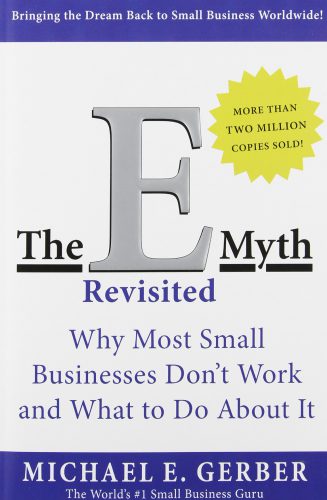 So, what is the e myth? It is the basic myth of all small business, the “entrepreneurial myth.” It usually starts with something along the lines of,
So, what is the e myth? It is the basic myth of all small business, the “entrepreneurial myth.” It usually starts with something along the lines of,
“Why am I working for this guy? . . . I know as much about this business as he does. If it weren’t for me, he wouldn’t have a business. Any dummy can run a business.” (pg. 12)
And thus is planted the idea that the promised land is just the other side of creating your own sole proprietorship.
While the truth of the matter is that most of us are talented enough to create our own businesses based on our skills, those skills are not all that is needed to run a business, and that is where the e myth bites us–and why so many small businesses don’t work.
What small (and all) businesses need to succeed
Small businesses usually struggle because we focus on the skills or producing the products that the business is based upon, but fail to realize that every business has three different parts, even if only one person is in charge of the whole show. Mr. Gerber calls this the “Fatal Assumption,” which is you believe that:
if you understand the technical work of a business, you understand a business that does that technical work. (Pg. 13)
Every company needs thinking in each of three different roles. The technician is only the first, because that is usually where most small companies begin. The technician is a graphic artist or editor, a copywriter, an accountant, an audio engineer, a designer, an electician, a carpenter, a barber, a software code writer, a butcher, baker, candlestick maker, or the like; really anyone who has a certain skill set that is integral to the functioning of a business or the creation of a product.
Most small businesses don’t struggle because they are bad at what they do, in fact, they are usually really good at it! The problem is, a business can be build around skills, but those skills don’t build the business. When the skillful technician is in charge, the business flounders. That’s because businesses also need managerial or entrepreneurial thinking.
You need a boss, even if you started your business to get away from one
The manager is usually the boss who organizes and systematizes your business. Managers are about structure and workflows; technicians are about the art of the work and creativity. Managers know that successful businesses are built on repeatable processes made simple enough that you can teach almost anyone to perform them; technicians prize the things that only they can do better than anyone else and are often convinced managers just want to kill the joy of the work they do by trying to make everything “cookie-cutter” simple.
Do you see why these two might have issues with one another? Especially if they are both one person? If they are both you?
Effective businesses are built on the speed and efficency of their processes, even more than on the skill exercised within those processes. Most of us don’t like that idea (becasue we’re technicians), but it is still true. That’s why the salesperson who has an art gallery often makes as much or more than the painter who he or she discovered. It is why McDonald’s exploded back in the 50s over companies that made better burgers. Repeatable, “franchisable” processes are what makes people millions. That’s why people who make millions are usually the ones who do something like have a chain of workout facilities across the state rather than the best workout facility in town. Quality is awesome, but how may clients you can leverage your skill set to serve is even better.
Enter the dreamer
Managers like everything fitting neatly in their boxes, and technicians want everything in those boxes to be extraordinary art. But those still aren’t enough. You also need the entrepreneur, the dreamer, the one who can see the possiblities of those “boxes” of quality services, how they might be adapted to different markets to solve different, bigger problems, ways to leverage what is in those boxes to sell to more customers, etc., etc. In other words, you also need someone who thinks outside of the box. You need your organizer and your artisan, but you also need your visionary. Without all three, your business isn’t likely to go anyway very fast unless you are as lucky as a lottery winner.
Three-in-one?
Want to know more about how to make these work? Well, that’s why Michael Gerber wore this book and revisited it years later to make it even better. Even though it was published in 1995–twenty years ago now; yoinks!–it is still one of the first books every small business owner should buy, read, highlight, take scrupulous notes in, and then do that all over again every few years. (Yes, that means if you have a small business or are thinking of creating one, I highly recommend this book to you.)
Have any of you read this before? If so, what did you think of it? Any thoughts on what I wrote above? Is Gerber’s way really the best for every small business as I explained it?
Book details: Michael E. Gerber, The E Myth Revisited: Why Most Small Businesses Don’t Work and What to Do About It (New York: Harper Business, 1995).

Recent Comments